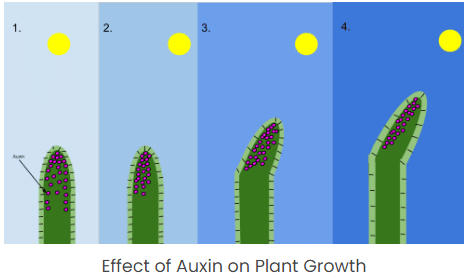Plant Growth Regulators - 1 | Agriculture Optional for UPSC PDF Download
| Table of contents |

|
| Introduction |

|
| Types of Plant Growth |

|
| Factors Affecting Plant Growth |

|
| Discovery of Plant Growth Regulators |

|
| Characteristics of Plant Growth Regulators |

|
Introduction
Plant growth regulators, also known as phytohormones or plant growth hormones, are chemical compounds that oversee various aspects of plant development and growth. These organic substances can be either artificially synthesized in laboratories or naturally produced within the plants themselves. They exert significant control over and influence the physiological processes related to plant growth, development, and movement.
Plant growth regulators are broadly categorized into two major groups based on their effects:
- Plant Growth Promoters
- Plant Growth Inhibitors
Plant growth promoters include substances like Auxins, Gibberellins, and Cytokinins, while plant growth inhibitors encompass Abscisic acid and Ethylene. It's worth noting that Ethylene can sometimes be classified as either a promoter or an inhibitor, depending on its specific effects.
Types of Plant Growth
- Primary and Secondary Growth:
- Primary growth involves the mitotic division of meristematic cells located at the root and shoot apices, leading to an increase in the plant's length.
- Secondary growth, on the other hand, pertains to the enlargement of the plant body's diameter through the division of secondary meristematic cells.
- Unlimited Growth: Unlimited growth refers to continuous growth from the germination stage until the plant's death.
- Limited Growth: In this stage, plant parts cease growing once they reach a specific size.
- Vegetative Growth: Vegetative growth encompasses the development of stems, leaves, and branches, excluding the formation of flowers.
- Reproductive Growth: Reproductive growth signifies the stage at which flowering occurs in plants.
Factors Affecting Plant Growth
There are four primary factors that play a pivotal role in determining plant growth:
Light
- Plants, as autotrophs, rely on light for the synthesis of their food.
- Inadequate light or its absence can significantly impede plant growth.
- The intensity, quality, and duration of light influence various physiological processes, including stomata movement, chlorophyll production, photosynthesis, flowering, and fruiting.
- Plant growth may be hindered during shorter days in the winter when light is limited.
Water
- Water is indispensable for plant survival, with approximately 90% of a plant's composition consisting of water.
- In the absence of water, plants become stressed and eventually die.
- Soil moisture is absorbed by plants, facilitating the uptake and transport of essential nutrients while keeping the plant hydrated.
Temperature
- Temperature has a profound impact on plant growth.
- Higher temperatures accelerate processes like transpiration, photosynthesis, and germination.
- Conversely, lower temperatures can decelerate plant growth.
Nutrients
- Similar to humans, plants require adequate nourishment for their growth and development.
- Soil nutrients are categorized into macronutrients and micronutrients.
- Macronutrients, such as nitrogen, potassium, calcium, magnesium, sulfur, and phosphorus, are vital for plant growth.
- Micronutrients, including iron and copper, are also essential.
- Nutrient deficiencies in plants can make them susceptible to various diseases and hinder their growth, even if only one nutrient is lacking.
Discovery of Plant Growth Regulators
The discovery of major plant growth regulators, although initially a result of serendipity, can be traced back to the work of Charles Darwin and his son, Francis Darwin. They observed the phenomenon of phototropism, where coleoptiles of canary grass exhibited growth towards a source of light. Through a series of experiments, they deduced the existence of a substance that could influence the growth of canary grass towards light. This substance, later identified as auxin, was isolated by F.W. Went.
Subsequently, various scientists made further discoveries and isolated different plant growth regulators. E. Kurosawa reported the presence of gibberellins or gibberellic acid in uninfected rice seedlings. Another growth-promoting substance, now known as cytokinins, was discovered by F. Skoog and Miller and initially referred to as kinetin.
Characteristics of Plant Growth Regulators
- Just as plants require oxygen, water, sunlight, and nutrients for their growth and development, they also rely on specific chemical substances to govern their growth and development. These chemical substances are known as Plant Growth Regulators and are naturally synthesized by plants themselves.
- These regulators are simple organic molecules with diverse chemical compositions and are often referred to as phytohormones, plant growth substances, or plant growth hormones.
- They have the ability to either accelerate or inhibit the rate of plant growth.
- Plant growth hormones or plant growth regulators manifest the following characteristics:
- Influence the differentiation and elongation of cells.
- Play a role in the formation of leaves, flowers, and stems.
- Can cause wilting of leaves.
- Are involved in the ripening of fruit.
- Regulate aspects like seed dormancy, among others.
- There are typically five primary types of plant hormones, namely auxin, gibberellins (GAs), cytokinins, abscisic acid (ABA), and ethylene. Additionally, there are various derivative compounds, both natural and synthetic, that also function as plant growth regulators.
|
52 videos|224 docs
|















